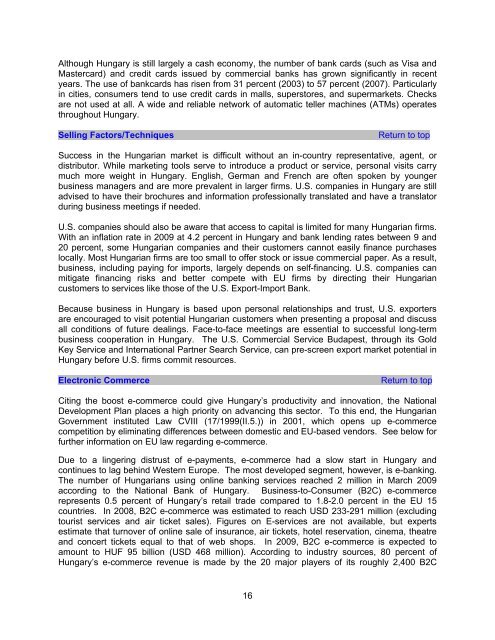Doing Business in Hungary 2010 - International Franchise Association
Doing Business in Hungary 2010 - International Franchise Association
Doing Business in Hungary 2010 - International Franchise Association
Create successful ePaper yourself
Turn your PDF publications into a flip-book with our unique Google optimized e-Paper software.
Although <strong>Hungary</strong> is still largely a cash economy, the number of bank cards (such as Visa and<br />
Mastercard) and credit cards issued by commercial banks has grown significantly <strong>in</strong> recent<br />
years. The use of bankcards has risen from 31 percent (2003) to 57 percent (2007). Particularly<br />
<strong>in</strong> cities, consumers tend to use credit cards <strong>in</strong> malls, superstores, and supermarkets. Checks<br />
are not used at all. A wide and reliable network of automatic teller mach<strong>in</strong>es (ATMs) operates<br />
throughout <strong>Hungary</strong>.<br />
Sell<strong>in</strong>g Factors/Techniques Return to top<br />
Success <strong>in</strong> the Hungarian market is difficult without an <strong>in</strong>-country representative, agent, or<br />
distributor. While market<strong>in</strong>g tools serve to <strong>in</strong>troduce a product or service, personal visits carry<br />
much more weight <strong>in</strong> <strong>Hungary</strong>. English, German and French are often spoken by younger<br />
bus<strong>in</strong>ess managers and are more prevalent <strong>in</strong> larger firms. U.S. companies <strong>in</strong> <strong>Hungary</strong> are still<br />
advised to have their brochures and <strong>in</strong>formation professionally translated and have a translator<br />
dur<strong>in</strong>g bus<strong>in</strong>ess meet<strong>in</strong>gs if needed.<br />
U.S. companies should also be aware that access to capital is limited for many Hungarian firms.<br />
With an <strong>in</strong>flation rate <strong>in</strong> 2009 at 4.2 percent <strong>in</strong> <strong>Hungary</strong> and bank lend<strong>in</strong>g rates between 9 and<br />
20 percent, some Hungarian companies and their customers cannot easily f<strong>in</strong>ance purchases<br />
locally. Most Hungarian firms are too small to offer stock or issue commercial paper. As a result,<br />
bus<strong>in</strong>ess, <strong>in</strong>clud<strong>in</strong>g pay<strong>in</strong>g for imports, largely depends on self-f<strong>in</strong>anc<strong>in</strong>g. U.S. companies can<br />
mitigate f<strong>in</strong>anc<strong>in</strong>g risks and better compete with EU firms by direct<strong>in</strong>g their Hungarian<br />
customers to services like those of the U.S. Export-Import Bank.<br />
Because bus<strong>in</strong>ess <strong>in</strong> <strong>Hungary</strong> is based upon personal relationships and trust, U.S. exporters<br />
are encouraged to visit potential Hungarian customers when present<strong>in</strong>g a proposal and discuss<br />
all conditions of future deal<strong>in</strong>gs. Face-to-face meet<strong>in</strong>gs are essential to successful long-term<br />
bus<strong>in</strong>ess cooperation <strong>in</strong> <strong>Hungary</strong>. The U.S. Commercial Service Budapest, through its Gold<br />
Key Service and <strong>International</strong> Partner Search Service, can pre-screen export market potential <strong>in</strong><br />
<strong>Hungary</strong> before U.S. firms commit resources.<br />
Electronic Commerce Return to top<br />
Cit<strong>in</strong>g the boost e-commerce could give <strong>Hungary</strong>’s productivity and <strong>in</strong>novation, the National<br />
Development Plan places a high priority on advanc<strong>in</strong>g this sector. To this end, the Hungarian<br />
Government <strong>in</strong>stituted Law CVIII (17/1999(II.5.)) <strong>in</strong> 2001, which opens up e-commerce<br />
competition by elim<strong>in</strong>at<strong>in</strong>g differences between domestic and EU-based vendors. See below for<br />
further <strong>in</strong>formation on EU law regard<strong>in</strong>g e-commerce.<br />
Due to a l<strong>in</strong>ger<strong>in</strong>g distrust of e-payments, e-commerce had a slow start <strong>in</strong> <strong>Hungary</strong> and<br />
cont<strong>in</strong>ues to lag beh<strong>in</strong>d Western Europe. The most developed segment, however, is e-bank<strong>in</strong>g.<br />
The number of Hungarians us<strong>in</strong>g onl<strong>in</strong>e bank<strong>in</strong>g services reached 2 million <strong>in</strong> March 2009<br />
accord<strong>in</strong>g to the National Bank of <strong>Hungary</strong>. <strong>Bus<strong>in</strong>ess</strong>-to-Consumer (B2C) e-commerce<br />
represents 0.5 percent of <strong>Hungary</strong>’s retail trade compared to 1.8-2.0 percent <strong>in</strong> the EU 15<br />
countries. In 2008, B2C e-commerce was estimated to reach USD 233-291 million (exclud<strong>in</strong>g<br />
tourist services and air ticket sales). Figures on E-services are not available, but experts<br />
estimate that turnover of onl<strong>in</strong>e sale of <strong>in</strong>surance, air tickets, hotel reservation, c<strong>in</strong>ema, theatre<br />
and concert tickets equal to that of web shops. In 2009, B2C e-commerce is expected to<br />
amount to HUF 95 billion (USD 468 million). Accord<strong>in</strong>g to <strong>in</strong>dustry sources, 80 percent of<br />
<strong>Hungary</strong>’s e-commerce revenue is made by the 20 major players of its roughly 2,400 B2C<br />
16
















